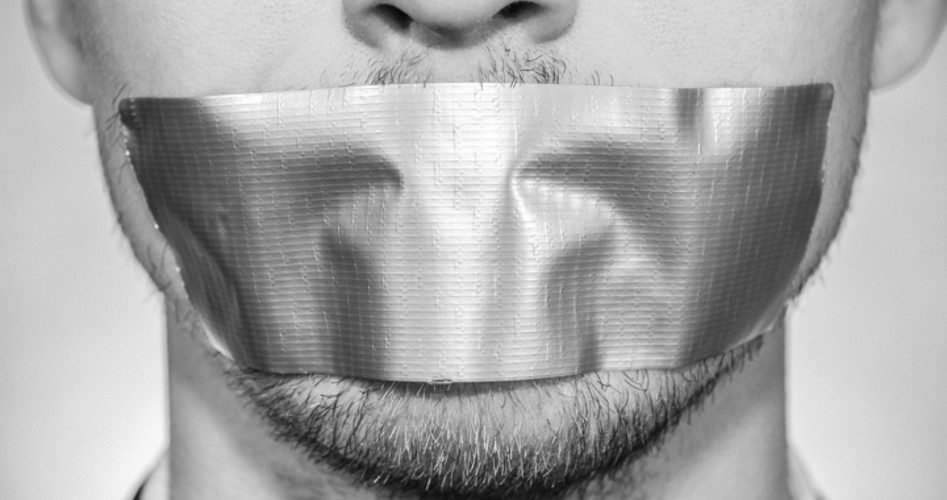
“I do not agree with what you have to say, but I’ll defend to the death your right to say it,” Evelyn Beatrice Hall once wrote. Hall’s pithy, concise quote is considered by many to be the ultimate defense of free speech. It was a truism; something we all, liberal and conservative alike, agreed upon in America. But on American college campuses in recent years, it appears as if an unseen editor has added the clause “unless what you say offends me” to Hall’s quote.
A recent Gallup/Knight Foundation survey gives some interesting insights into how today’s college students view our First Amendment-protected rights.
Twenty-nine percent of college students said it is acceptable for colleges to “promote a postive environment” by prohibiting certain speech, up from 22 percent in 2016, while 70 percent said they favored an “open learning environment” that allowed offensive speech, down from 78 percent in 2016.
Inclusion is apparently more important to today’s college students than free speech. When asked which is more important, protecting free speech rights or promoting an inclusive environment, students chose inclusion 53 percent to 46 percent. While being inclusive is certainly important, there’s no way it should more important than a person’s right to speak their mind without fear of retribution.
And that retribution is not simply a matter of being shouted down by oversensitive fellow students or marginalized by leftist professors. Many universities have now enacted speech codes, which prohibit certain speech on campuses. Failing to comply with these speech codes often comes with real life penalties, including fines, academic probation, and even expulsion. With America’s universities now “abridging the freedom of speech” on campuses, are such restrictions on everyday Americans far behind?
Thirty-seven percent of college students believe that it is sometimes acceptable to shout down speakers with whom they disagree. More startling, 10 percent of students believe that it is acceptable to use violence in order to shut down a speech. While 10 percent seems like a low number, if the poll is correct, it means that more than two million American college students believe that it is ok to use violence in order to shut down a speaker they disagree with. This is what happened last year when Charles Murray attempted to speak at Middlebury College in Vermont.
{modulepos_inner_text_ad}
It’s easy to forget how good we’ve had it in America. While many places in the world claim to cherish the concept of free speech, the United States is really the only place where it is codified in law that the right exists. On that note, while the majority of college students surveyed did support the First Amendment’s protections for freedom of speech, they feel those rights are becoming less secure in America. Sixty-four percent of students believe that the right to free speech is secure, down from 73 percent in 2016. Belief that the freedom of religion is secure is more stable, but still dropped from 68 percent in 2016 down to 64 percent. Belief that the freedom of the press is secure dropped radically, from 81 percent in 2016 down to 60 percent today.
Canada offers a good example as to where free-speech rights in this country could be headed. In June of 2017, our neighbor to the north passed bill C-16, a law which compels Canadians to use the pronouns that transgender people prefer under penalty of law. Misuse of such pronouns (including manufactured pronouns such as ze, zir, hir, and mer) is considered a “hate crime” in Canada.
University of Toronto professor Jordan Peterson caused an internet firestorm with his video arguing against the law. “I’m nervous about doing this lecture and I’ve also become nervous about some of the things that I’m teaching,” Peterson said. “I think that some of the things that I say in my lectures now might be illegal…. I think that they might even be sufficient for me to be brought before the Ontario Human Rights Commission under their amended hate speech laws. And that scares me….”
Such laws may seem to be the problem of other countries. After all, in America we have the First Amendment to protect our free speech. Maybe, but as far as our Bill of Rights goes, one need only look to the Second Amendment to see how rights can be whittled away. “The right of the people to keep and bear arms, shall not be infringed,” seems pretty clear. But that right has been infringed upon many times in the form of restrictive purchasing laws. Now, groups such as March for our Lives look to restrict gun ownership even further.
So, it’s prudent to keep a watchful eye on all assaults on our free speech, especially on college campuses where, presumably, the leaders of our next generation are being groomed.
Evelyn Beatrice Hall’s quote remains the gold standard of words in defense of free speech. But Peterson recently uttered another truism that deserves to go beside it. When asked by British talking head Cathy Newman why his freedom of speech should trump a transgendered person’s right not to be offended, he offered this zinger: “Because in order to be able to think, you have to risk being offensive.”


